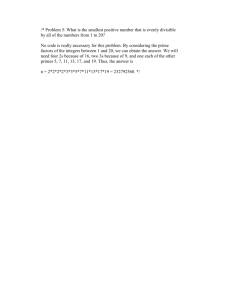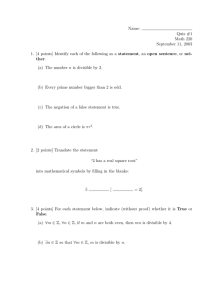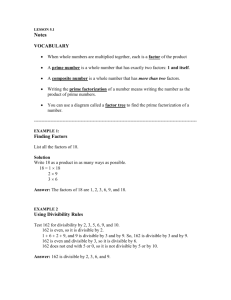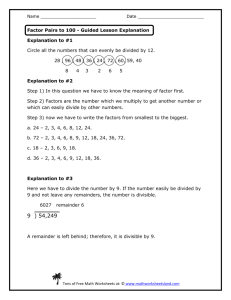Number Theory Primes, factorization, divisibility rules
advertisement
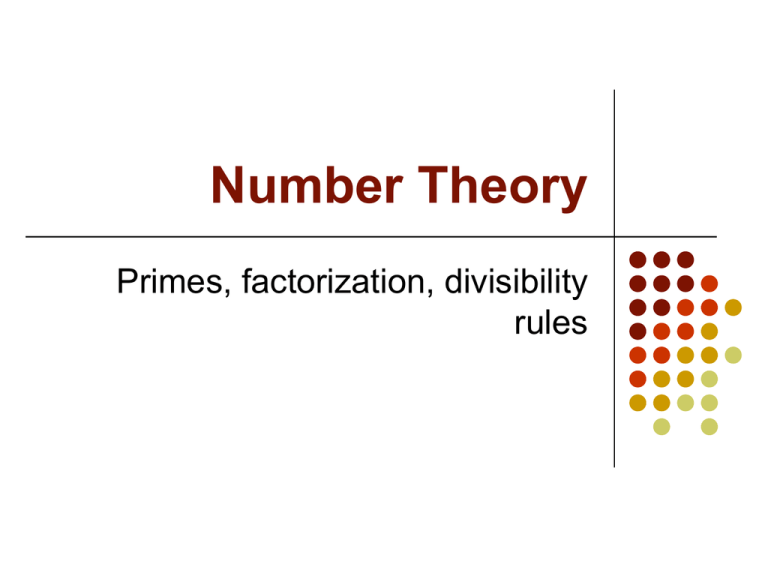
Number Theory Primes, factorization, divisibility rules “divisible by” Let a and b be any whole numbers and a0. We say that a divides b, a|b, if there is a whole number x such that ax=b. The following mean the same thing: a divides b, b is divisible by a, a is a factor of b, b is a multiple of a Our homework problem #4 1001|abcabc 7, 11, 13|1001, So it must be that 7, 11, 13|abcabc Claim: If d is not 0 and d|e then d|ef. Grid rectangle problem For numbers of tiles 1 through 24 build all grid rectangles that you can. How do you know you have all of them? What patterns do you notice? 1x4 4x1 Claims Primes and composites A counting number with exactly 2 different factors is called a prime number. A counting number with more than two factors is called a composite number. Examples of prime numbers: Examples of composite numbers: What do you notice? 1 2 3 4 =22 5 6 =23 7 8 =222 9 =33 10 =25 11 12 =223 13 14 =27 15 =35 16 =222 2 17 18 =233 19 20 =225 21 =37 22 =211 23 24 =222 3 25 =55 26 =213 27 28 =333 =227 29 30 =235 Question: Can every number be written as product of primes? Solve simpler problem: Can 72 be written as product of primes? Unique prime factorization Each composite number can be written as a product of primes in exactly one way (up to the order of factors). 72 = 23 32 81=34 Food for thought Is 401 prime or not? If it is not, what is its prime factorization? What about 5439? What about 15249? How would you approach this question? How do we deal with large examples? I know that none of these are divisible by 2, 5 or 10. How? Divisibility by 2 A whole number is divisible by 2 if its ones digit is 0, 2, 4, 6, or 8. Proof: Claim: If a number divides two other numbers then it divides their sum as well. a|m and a|n, so a|(m+n) Divisibility by 5 A whole number is divisible by 5 if its ones digit is 0 or 5. Proof: Divisibility by 10 A whole number is divisible by 10 if its ones digit is 0. A whole number is divisible by 10 if it is divisible by both 2 and 5. If a whole number is divisible by both 2 and 3 does it mean it’s divisible by 6? If a whole number is divisible by 4 and 6 is it divisible by 24? Food for thought Is 401 prime or not? If it is not, what is its prime factorization? What about 5439? What about 15249? Not divisible by 2, 5 What about 3? 7? 11? 13? 17? Divisibility by 3 A whole number is divisible by 3 if the sum of its digits is divisible by 3. Proof: 3| 401 3 | 5439 3 | 15249 401!@!*$#@^%#$!(^% What about this 401? How far should we go? I think once we’re past 20 all hope is gone and we should declare it prime! Am I right? Grid rectangle problem How many grid rectangles are there for any number m?
